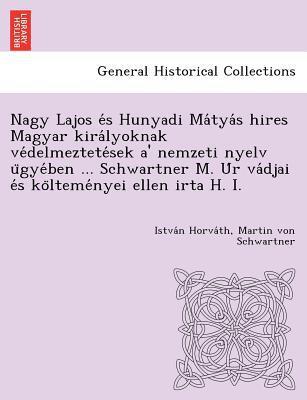
Nagy Lajos És Hunyadi Mátyás Hires Magyar Királyoknak Védelmeztetések A' Nemzeti Nyelv Ügyében ... Schwartner M. Úr Vádjai És Költeményei Ellen Irta H. I.
작성자
Istvan Horvath
아직 평점이 없습니다
Science & Technology
History
Business & Economics
+1
more
형식
페이퍼백
페이지
80
언어
헝가리어
출판됨
Jan 1, 2012
출판사
British Library, Historical Print Editions
ISBN-10
1249019664
ISBN-13
9781249019664
설명
In a captivating exploration of Hungarian history, two prominent figures delve into the lives of the esteemed kings, Nagy Lajos and Hunyadi Mátyás. The narrative intricately weaves together their legacies and the significance of protecting the national language. Through thoughtful commentary, the authors shed light on how these monarchs not only shaped the kingdom but also emphasized the preservation of cultural identity amidst a changing landscape.
The book presents a critique of Martin Von Schwartner's works, addressing the challenges posed to the Hungarian national discourse. Horváth's insights illuminate the historical context, allowing readers to understand the pressures faced by the Hungarian language and culture during times of political strife. He examines the intersection of power and language, portraying how critical it was for leaders to advocate for their nation’s linguistic heritage.
In both academic and poetic forms, the authors articulate their defense of Hungarian nationality and heritage. Their arguments resonate with a sense of pride and urgency, inviting readers to reflect on the complexities of cultural preservation. This profound engagement with history not only honors the contributions of these kings but also advocates for the continued relevance of the Hungarian language today.
The book presents a critique of Martin Von Schwartner's works, addressing the challenges posed to the Hungarian national discourse. Horváth's insights illuminate the historical context, allowing readers to understand the pressures faced by the Hungarian language and culture during times of political strife. He examines the intersection of power and language, portraying how critical it was for leaders to advocate for their nation’s linguistic heritage.
In both academic and poetic forms, the authors articulate their defense of Hungarian nationality and heritage. Their arguments resonate with a sense of pride and urgency, inviting readers to reflect on the complexities of cultural preservation. This profound engagement with history not only honors the contributions of these kings but also advocates for the continued relevance of the Hungarian language today.